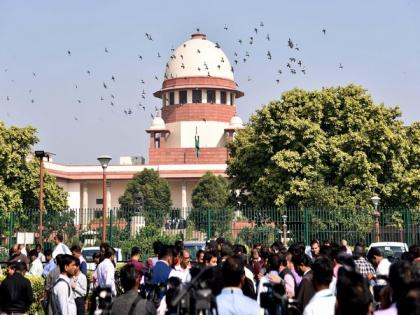FMP files plea in SC, seeks to be intervener in petition challenging constitutional validity of sedition under section 124A
By ANI | Published: July 14, 2021 05:01 AM2021-07-14T05:01:24+5:302021-07-14T05:10:08+5:30
Foundation of Media Professionals (FMP) has filed a petition before the Supreme Court seeking to be an intervener in the petition that has challenged the constitutional validity of the offence of sedition under Section 124 A of the Indian Penal Code (IPC).

FMP files plea in SC, seeks to be intervener in petition challenging constitutional validity of sedition under section 124A
Foundation of Media Professionals (FMP) has filed a petition before the Supreme Court seeking to be an intervener in the petition that has challenged the constitutional validity of the offence of sedition under Section 124 A of the Indian Penal Code (IPC).
The main petition was already, heard by a bench of the Apex Court, headed by Justice Uday Umesh Lalit and Ajay Rastogi that also issued notice to the Central government for its response in the matter.
The Supreme Court, had on Monday, adjourned and fixed the matter for further hearing to July 27, as the Central Government and the Attorney General (AG), couldn't file its response in the case.
The FMP, filed the petition, a copy of which was accessed by ANI, in the matter, before the Apex Court, through lawyer Rahul Bhatia.
Bhatia said that the FMP wanted to be an intervenor in the case and stated that the law of sedition is a colonial dictate, that was devised to "crush the indepth of the independence movement", and not out of democratic instincts.
"The uncertain measure of what constitutes seditious speech sparked a tussle between free speech and the law on sedition, which has been underway since the colonial era. In 1898, explanation was inserted to the provision to clarify that fair criticism of the government shall not amount to sedition. The observations made by the Select Committee while inserting such provisions give an insight into the displeasure of the British in limiting the scope of the provision, which limited their powers to curtail rebellion," the FMP said, in its petition filed before the Supreme Court.
"It is relevant to note, however, that the Indian courts have largely crusaded against regarding every unpleasant word as 'actionable', championing the cause of the media. However, with the evolution of the internet-dependent society, it has become relevant more than ever, to scrutinise laws on sedition, particularly as such laws are instruments of the Government," read the plea.
The FMP, in its petition, submitted that section 124-A of the IPC casts such a wide net on the speech and writing of media professionals, that virtually any opinion on any subject would be covered by it, as any serious opinion against the government measures and actions, are presumed anti-government (or anti-national, to use the prevalent street slang) and seditious by the public officials.
"In fact, any valid criticism or opinion of any legislation, policy or measures taken by the Government, is interpreted to mean 'disaffection towards the Government established by law'," the FMP said in its petition.
The term 'disaffection towards the Government established by law' is vague, ambiguous, is capable of being interpreted subjectively, and is regularly misused as a tool to persecute political dissent, the FMP stated in its petition.
Therefore, Section 124 A of the IPC is not in consonance with the principles of law pronounced in various judgments of the Supreme Court, it said.
( With inputs from ANI )
Disclaimer: This post has been auto-published from an agency feed without any modifications to the text and has not been reviewed by an editor
Open in app